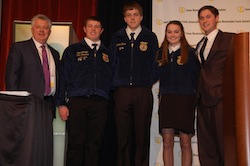 Not long ago, they couldn’t give the stuff away. Now, with the rise of biodiesel, inedible kitchen grease (IKG) has become a hot commodity … so hot it’s being stolen. This article from Biodiesel Magazine says a new campaign is underway to stop those thieves in their slippery tracks.
Not long ago, they couldn’t give the stuff away. Now, with the rise of biodiesel, inedible kitchen grease (IKG) has become a hot commodity … so hot it’s being stolen. This article from Biodiesel Magazine says a new campaign is underway to stop those thieves in their slippery tracks.
David Isen, asset protection manager for Imperial Western Products, spoke on an IKG theft panel at the California Biodiesel and Renewable Diesel Conference in San Diego last week. In a low market, Isen said 20 to 30 percent of IKG is lost to grease thieves.
Isen said there are two types of grease thieves in California: those licensed by the California Department of Food and Agriculture, which are opportunists and account for only 20 percent of stolen grease; and the unlicensed bootleggers, which account for the lion’s share of 80 percent of stolen product—where the real threat lies.
Not only do grease thieves steal IKG from containers owned by legitimate businesses, but Isen warned some go to extremes by highjacking whole containers and repainting them to try covering their tracks. They employ tactics to cut, damage or destroy containers, or even buy container keys from competitors, to illegally obtain product.
He offered tips to help identify habitual grease thieves in California. Watch for an expired or fake IKG sticker on their truck or no sticker at all. Their trucks will also often lack company signage and a California business license number. Grease thieves can also be spotted by their dirty and atypical collection vehicles, and may be lacking a TK or TL sticker indicating it’s a licensed truck or trailer. Isen also said to be wary of collectors operating between the hours of 2am and 6am.
New highway billboards in the “Stop Grease Theft Now” program will be going up soon, getting out the message of $500 rewards for information leading to the arrest of individuals responsible for stealing IKG. New bills in the California legislature are also looking to give law enforcement the tools it needs to stop this crime.











